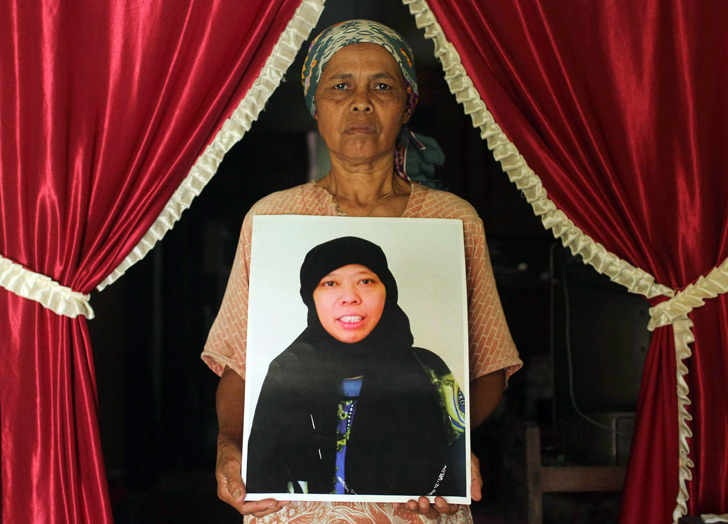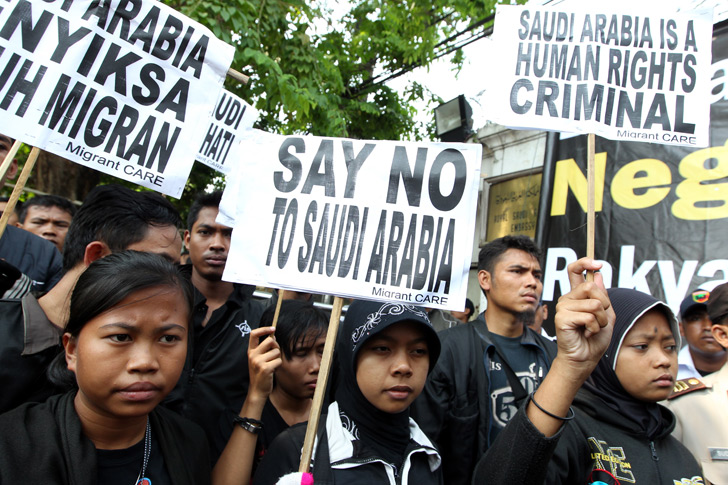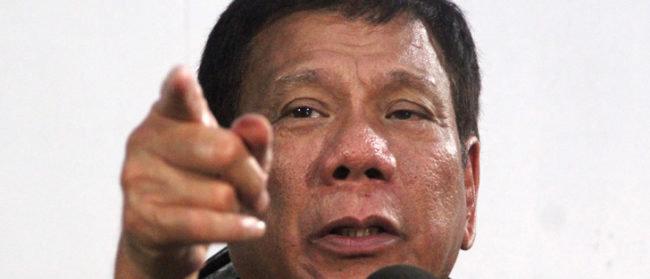In 2011, Satinah, an Indonesian who had travelled to Saudi Arabia to work as a maid, was sentenced to death for killing her boss four years earlier. There were reports that she acted in self-defence and had regularly suffered physical abuse at the hands of her employer in the past. But with her family back in Central Java, she was alone and powerless.

“Migrants [in Saudi Arabia] are at high risk of being victims of spurious charges,” said Nisha Varia, women’s rights advocacy director at Human Rights Watch. “A domestic worker facing abuse or exploitation from her employer might run away and then be accused of theft. Employers may accuse domestic workers, especially those from Indonesia, of witchcraft. Victims of rape and sexual assault are at risk of being accused of adultery and fornication.” According to the rights group, migrants are often prevented from accessing legal services or contacting their embassies.
But unlike the dozens executed in Saudi Arabia each year, Satinah had a chance to live. The family of the deceased employer announced that it was willing to accept cash in exchange for her freedom, an established arrangement under Saudi law. The price, $1.87m, was beyond reach for Satinah’s family. The Indonesian government refused to intervene, and the situation looked hopeless. But all that changed when Anis Hidayah, executive director and co-founder of the NGO Migrant Care, became involved.
For a group working on an often depressing issue, Migrant Care’s Jakarta office has an aura of positivity. You can feel it once you step inside the airy, three-storey building tucked into a quiet Jakarta residential block. The staff are not overwhelmed by the burden of the task at hand, although they would perhaps be forgiven for feeling that way.
Migrant Care has a simple goal: protect and empower migrant workers, and ensure that they have access to justice. In practice, it’s an incredible amount of work. The 20-strong team must juggle lobbying for better migrant worker legislation, holding government agencies accountable, providing legal services to returned migrant workers who were victims of crimes and engaging in constant media advocacy.
It is not a typical NGO staff. Several are former migrant workers themselves, who were trafficked abroad and in some cases exploited. One staff member revealed how she escaped from her employer in Malaysia and had to pay a trafficker several hundred dollars to be smuggled back into Indonesia. Another said she was recruited at 17 and given a passport that falsified her age.
And in case they need a reminder to stay motivated, the top floor of the office is a shelter for female migrant workers who, for physical or psychological reasons, need a space to rehabilitate before they can return home.
Mass migration
In a sense, Migrant Care is a microcosm of Indonesia, where nearly every person’s life is touched in some way by migration. This sprawling, diverse country of 17,000 islands, 300 languages and more than 240 million people is also one of the poorest countries in the world. In villages across the archipelago, jobs are rare and there is immense pressure on young people to seek work abroad to help support their families.
Hidayah grew up in one of these villages, Bojonegoro, in the province of Central Java, from which a disproportionate percentage of migrant workers hail. Her parents, who were both teachers, were relatively well off. Her neighbours, however, were not. “My roots are a very isolated village – all my community was migrant workers,” she said.
Recruiters, who are employed by agencies, travel to poor villages where they talk up lucrative jobs overseas. Their primary targets are young women, who are in the highest demand as domestic workers, maids and other less savoury positions abroad.
Migrant Care estimates that 7.5 million Indonesians work overseas and send remittances to their families. They mostly end up in countries with appalling human rights records, such as Malaysia, Saudi Arabia and Qatar. Workers are shackled to long-term contracts that force them to work for a single employer.
As many have found out the hard way, their pay is often less than expected and they are regularly subjected to long hours, abusive bosses and, in certain cases, rape and sexual harassment. Migrant Care estimates that three Indonesians die abroad each day – nearly 1,000 per year. The causes include negligence, murder, suicide, disease or mass tragedy, as happened in September 2015 when 50 workers, whose visas had expired, died when a rickety, illegal boat sank en route from Malaysia to Indonesia.
For years, there was silence about the plight of migrant workers. No domestic organisations were working on their behalf, and there was no coverage in the Indonesian media. Hidayah was in college when she began to hear stories about the experiences of her neighbours who had gone abroad. She was perplexed. They had been promised money and wealth, but despite sending their daughters and sons abroad, remained poor. Then Hidayah met a woman who had been raped while working in Saudi Arabia. She soon discovered this was not a unique story, but rather one shared among many women.
Her interest piqued, she gave up her master’s studies and helped to form Migrant Care. The timing was opportune. Throughout Hidayah’s youth, the country was a dictatorship under Suharto, and the government profited handily from migrant workers; recruiters were required to pay both formal fees and, quite often, bribes to officials. The government, in turn, did little to hold recruiters accountable or ensure that workers’ contracts were genuine and enforceable.
“She could have worked as a civil servant or a company employee with good salaries – like most college graduates – but she decided to set up Migrant Care, dedicating her life to their cause,” said Andreas Harsono, a researcher with Human Rights Watch. “She lives a simple life. Hers is a life of sacrifice.”
Migrant Care faced many challenges during its early years. Legislation got trapped in lengthy parliamentary processes. When cases were filed in courts, corrupt judges often sided with perpetrators. Agencies that were known to traffic workers disappeared or went bankrupt when confronted, with the staff quickly forming new agencies that continued to trick workers.
Moreover, Indonesia’s vast archipelago made village-level education costly, slow and difficult to scale up. Local or regional government officials, many of whom had been recently empowered by decentralisation, were still taking money from migrants. In fact, Migrant Care estimates this to be the third-largest source of government revenue.
Realising that government lobbying was not the answer, Migrant Care created public campaigns previously unseen in Indonesia. Satinah’s case was a prime example. Once they confirmed her story, they launched a massive social media campaign, calling on regular Indonesians to donate to save Satinah. The first of its kind in the country, it went viral and for weeks the hashtag #SaveSatinah trended on Twitter. A petition on Change.org’s Indonesian site garnered thousands of signatures, and money poured in.
Politicians began paying attention, too, pushed by the national uproar. At the last minute, the government changed its mind and agreed to pay the remainder of the blood money. Satinah returned to Indonesia in September.
Victory is rarely quick for Migrant Care, so the staff must have incredible patience: the #SaveSatinah campaign took three years. Other efforts take much longer, such as Migrant Care’s push to have Indonesia ratify the Convention on Migrant Workers, which took 13 years of lobbying and advocacy.
Nevertheless, much has changed since the organisation was founded in 2004. Migrant workers’ issues now regularly make the front pages of Indonesian papers, and Migrant Care press conferences are attended by dozens of reporters from TV, radio and print outlets. Politicians know this is not an issue they can ignore.
At the same time, the problem persists. Satinah is one of the millions of migrant workers around the world caught in vulnerable, often dangerous situations. “Our struggle is still long,” said Hidayah. “We hope that people’s solidarity, from all around the world, will continue to protect migrant workers and have them be treated as human beings.”


